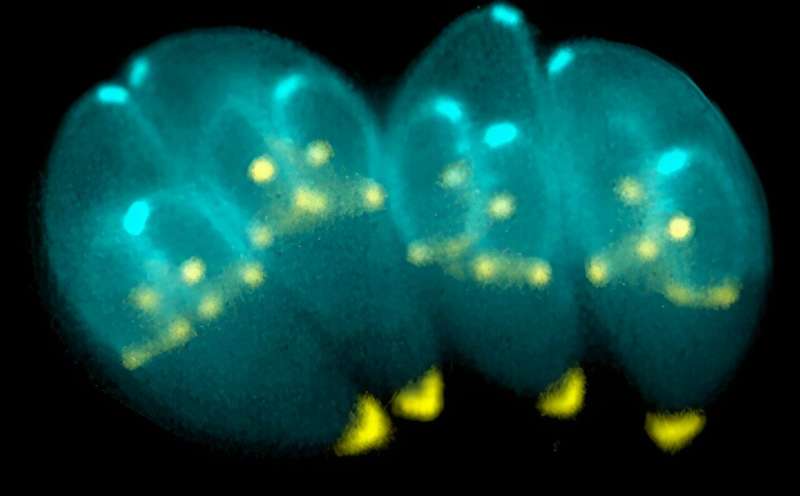This article has been reviewed according to Science X's editorial process and policies. Editors have highlighted the following attributes while ensuring the content's credibility:
fact-checked
peer-reviewed publication
trusted source
proofread
Study identifies six drugs that can be repurposed for treatment of toxoplasmosis

Scientists are looking for new ways to treat toxoplasmosis, an infectious disease that affects more than a third of the world population. One of the most recent advances is reported in an article published in the journal PLOS ONE by researchers at the Jundiaí Medical School (FMJ) in São Paulo state, Brazil.
The group screened 160 existing drugs to explore their potential repurposing to combat toxoplasmosis. The drugs belonged to the COVID Box, a library of compounds developed by Medicines for Malaria Venture (MMV) to combat SARS-CoV-2. MMV is a nonprofit created to develop new affordable antimalarial drugs through public-private partnerships.
"We identified six compounds that are at least 30 times more deadly for the toxoplasmosis parasite than for the host cells," said Juliana Quero Reimão, last author of the article. The six compounds were ethaverine, almitrine, fluspirilene, thiethylperazine, PB38 and nebivolol.
"Almitrine is usually prescribed for chronic obstructive pulmonary disease [COPD]. We tested it on mice with chronic toxoplasmosis and found it to be effective, leading to a significant reduction in brain parasite load," said Reimão, a professor of parasitology and thesis advisor for FMJ's program of graduate studies in health sciences.
Researchers affiliated with the Federal University of Alfenas (UNIFAL) and the Federal University of Paraíba (UFPB) collaborated with Reimão.
Experiments
In the laboratory, the COVID Box compounds were first evaluated in human cells infected by Toxoplasma gondii, the protozoan parasite that causes toxoplasmosis. Computational analysis was also conducted to evaluate absorption, distribution, metabolism, excretion and toxicity.
"All the selected compounds performed well in terms of gastrointestinal absorption and permeation of the blood-brain barrier [a protective layer of cells lining the inner surfaces of blood vessels inside the brain], a desirable characteristic for treatment of diseases caused by parasites that infect brain cells. We were looking for compounds that could enter cells and eliminate the pathogen without harming the host cells," Reimão explained.
More trials are needed before any of the drugs can be repurposed for the treatment of toxoplasmosis, but the results so far are highly promising, she added. "More studies will follow on the basis of our research. We're still evaluating other compounds, and they may be even better than those already identified," she said.
It is important to develop new therapies for toxoplasmosis, she stressed. "The limited number of drugs to treat the infection in the acute stage often leads to hypersensitivity and toxicity. Effective treatment options for pregnant women with the disease and for chronic toxoplasmosis are also limited, highlighting the need for further research and development," she said.
Treatment of the disease is complex because it progresses in two stages. Effective drugs are available for the acute stage, but they are no longer useful when the disease becomes chronic. In the acute stage, the patient is infected by consuming contaminated water or food. The parasite can also be transmitted to a fetus from an actively infected mother during pregnancy.
In the acute stage, which can last several weeks, the parasite reproduces swiftly and intensely, mainly colonizing brain, eye and muscle cells, and creating cysts in which to hide. The symptoms then vanish, and the chronic or latent stage begins.
The disease becomes dangerous if the host's immunity weakens. T. gondii may then reactivate and cause serious problems including cerebral complications, potentially killing the patient. Pregnant women are routinely tested for toxoplasmosis in the first trimester. The main risk in this group is fetal contagion, resulting in congenital toxoplasmosis. Men can spend their lives without being screened and only discover they are infected if they become immunocompromised.
Contamination of humans typically occurs via ingestion of water or food containing the parasite. The congenital form transmitted during pregnancy can cause miscarriage, malformation, and neurological, auditory and ocular sequelae. One in three Brazilians are estimated to have toxoplasmosis, according to Adolfo Lutz Institute, the central epidemiological surveillance laboratory for São Paulo state. In the United States, some 40 million adults and children are infected, according to the Centers for Disease Control and Prevention (CDC), and toxoplasmosis is the main cause of death from food-borne disease.
Most of those infected by T. gondii are asymptomatic. Some complain of muscle and joint pain, as well as flu-like discomfort, swollen lymph nodes and fatigue. The risk of having severe toxoplasmosis is greatest for babies born to mothers infected shortly before or during pregnancy, and for immunocompromised patients, such as those treated for cancer with certain kinds of chemotherapy, those who receive transplants, and those with HIV/AIDS. A diagnostic test is worthwhile for all these patients. If the result is positive, they should be treated until the symptoms improve.
Next steps for the researchers will include evaluating the other promising compounds in animals with toxoplasmosis, both acute and chronic. The group has also screened other boxes supplied by MMV, for a total of 600 evaluated compounds.
"The results in infected animals were promising for two other compounds and are now being written up for publication," Reimão said.
More information: Bruna Ramos dos Santos et al, Repurposing the Medicines for Malaria Venture's COVID Box to discover potent inhibitors of Toxoplasma gondii, and in vivo efficacy evaluation of almitrine bismesylate (MMV1804175) in chronically infected mice, PLOS ONE (2023). DOI: 10.1371/journal.pone.0288335





















